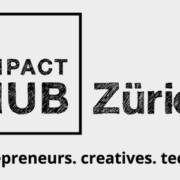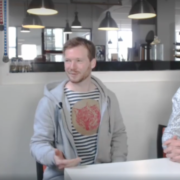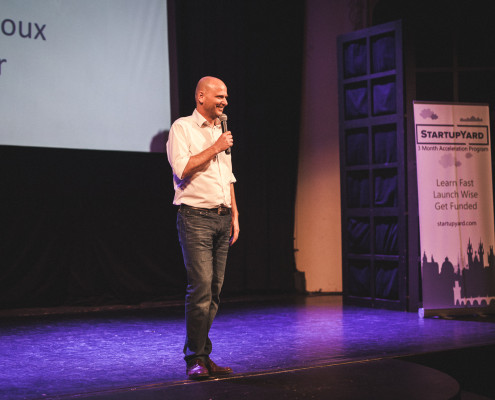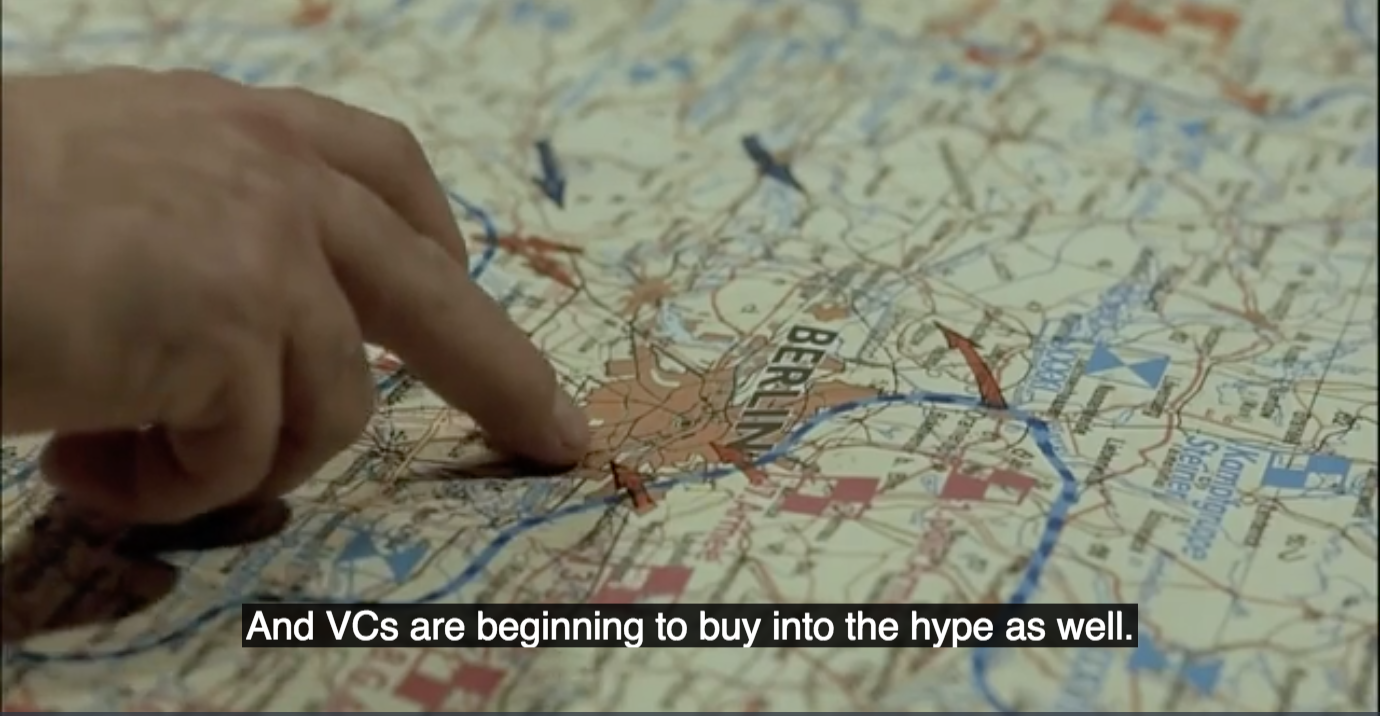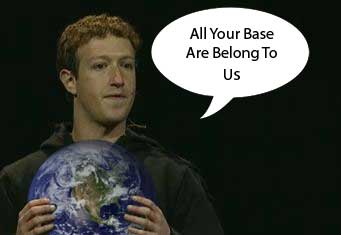Tomas Tunys: Machine Learning Geek
Tom Tunys is the “silent one,” of the Rossum.ai team. He is a prototypical machine learning geek, which is to say: quiet, thoughtful, and rigorous in his thinking. He joined StartupYard along with co-founders Tomas Gogar and Petr Baudis, two also geeky, but comparatively outspoken AI/ML geeks in their own right.
As StartupYard focuses on AI/Machine Learning startups and founders for our upcoming round of acceleration (applications close June 30th), I reached out to Tomas to talk about his experience at StartupYard. Tomas is, as he would say, not a business minded person. This is the story of how he came to appreciate his experience at StartupYard despite initially doubting its value.
Here is what he had to say:
Hi Tomas, you have always been the quiet member of the Rossum.ai team. Can you tell our readers how you joined Rossum, and your background in Machine Learning and AI?

It’s almost a year since the moment Tomas, Petr, and I were discussing the possibility of creating our own startup, but our history together is much longer than that, so let me briefly tell you my story, and how we met.
In late 2012 I started my PhD studies at the Czech Technical University, under the Cloud Computing Center research group led by Jan Sedivy. It was there where the team behind Rossum first met (albeit not all at the same time). We all together worked on a dozen different machine learning applications, supervised students, and helped to build up what is now known as eClub Prague. To sum it up we have known each other for more than 3 years now.
When I think about it I started my PhD back then out of love for mathematics, optimization and machine learning that had built up in me doing my master’s thesis. I should say that prior to that I had no background in machine learning whatsoever but I could always appreciate the beauty and elegance of mathematics and optimization.
Since I had no clear idea what to work on I laid my hands on many different machine learning topics such as document classification, topic modeling, information retrieval, and learning to rank. The last mentioned has become the main focus of my research and it is about developing algorithms for sorting “things” in a particular order such that the final list has the desired property. One example for all would be a web search where you might try to order the list of documents for a query in a way optimized for user satisfaction.
To me this has always been about the act of accomplishing new things in a very intellectual way. What’s strange about my journey to Rossum and StartupYard is that I am really, really not a business guy. Not at all. I just love math.
You’ve described yourself as someone who finds the business aspect of technology unappealing. You’re very critical of business culture. What motivates you to do the work you do, and what do you hope will come from it?
Quite simple to answer: I do what I do because I love it, and moreover I work with amazing, smart, and genuine people which I see as an endless source of inspiration and motivation.
What am I working on right now? I am part of the research and development team in Rossum which is currently building a machine learning engine capable of reading and understanding the content of textual documents on a human level.
This is of course a far-fetched goal (yes, even now with the current level of technology) and we wanted to make a business case out of it right now, not really building a business on empty-handed promises.
We know that we need to take small steps, like the saying “you need to learn how to walk before you can run” (I can imagine a business person would use fly instead of run without hesitation here), so we decided to focus on understanding a particular instance of documents, which are invoices. I’ll leave what we do in Rossum at that, you can find out more at rossum.ai.
What I hope will come out of our work? My only hope is that in the end we built something amazing that everyone can benefit from.
I am of course looking far into the future, but just imagine what can be done with a technology that can go through gazillions of documents accumulated throughout our history, such as research articles, medical reports, legal documents, books, newspapers, internet -take your pick- and provide access to knowledge, not only information, hidden inside them.
How much can research be sped up? How many lives could be saved? How many hours could be spared at court (sounds stupid unless you know how the Czech judiciary system works)? The list may go on. And I know I chose words that make this sound totally abstract and unspecific and I made it deliberately, because it would be really hard for me to formulate concretely what I mean by “access” (interface specification) and “knowledge” (data store and inference engine).
This is something we will be more than happy to contemplate at Rossum.
We had a discussion recently about the impact that AI/ML is having and will have on humanity and society. Can you talk a bit about your perspective on the role AI will play in our lives going forward?
I think that ML already plays an important and maybe irreplaceable role in the everyday life of a modern person and it is going to be more so in the future.
So far ML (Machine Learning) is mostly prominent (and this is solely how I see it, and might be wrong) in the realm of the internet. Web search, social networks, e-commerce, all these services are intertwined with ML algorithms which are programmed to make a user more satisfied, more engaged, click more, purchase more, etc. But ML is going to have a big voice in “the real world” pretty soon (Do not ask what soon means!), for example, Tesla with its self-driving cars.
This big shift is going to make Machine Learning something that more people can directly benefit from. ML works best wherever there is the most data to leverage. That has meant the internet, and advertising, and so forth, but soon it will mean anywhere there is a sensor and a stream of data coming in. It is hard to imagine the range of applications that will propagate from the Internet of Things.
Let’s play for a bit on a more futuristic and philosophical note, because such a question always deserves it.
In my opinion, it is just a matter of time before AI reaches and supersedes the human level of performance in every aspect. There is nothing that would suggest otherwise, on the contrary, and that makes me think what would be there left for humans?
Everyone kind of says, there will always be something left, without having any clue what that something might be, which does not give me a lot of comfort. I fear that in the end AI will rob us of our curiosity, which I reckon is the main driving force of human progress (definitely of mine). Just think about it, there is no way anyone would wait for you to find answers which are already there (definitely not in a business) – the only person that would need to resist going for the shortcut and get the answer from your pal HAL, is you.
Sadly, I do not see people nowadays willing to ponder over even the simplest of problems, stackoverflow-copy-paste simply wins (if you are a programmer you know what I am talking about). Now imagine there is an omniscient stackoverflow — disaster is in our way! Is there a solution or is it even a problem that needs solving? I do not know what it is for you, but I’d rather stay curious.
We also talked about the nature of intelligence, our assumptions about our own intelligence, and the capabilities and benefits/drawbacks of AI. What do you think most people are getting wrong in our understanding of these topics?
Let me share with you some of my thoughts on how some of us may see their own intelligence and relate it to the idea of (general) AI.
I think that people tend to think about themselves and their intelligence as something superior, and (so far) unmatched, yet I do not think there is an agreed upon concept of AI. There is definitely more than one, hence, for me there is not a firm ground to base a comparison on. How do we define general AI if we don’t understand what makes us intelligent to begin with?
But this sort of an egoistic self-regard, a proclaimed superiority in terms of intelligence that should definitely not become part of the AI we are trying to build. Because if you stop for a second to think about how we treat the runner ups in this ridiculous game you would not want to become a runner up.
Machines can replace humans, like machines have replaced humans throughout history. But there is an important distinction: the machines do not replace humans by doing exactly what humans used to do. Hand-sewing was replaced by the loom. Hand crafting of parts has been replaced by machine tools and moldings, and now 3D printing. The machines that replace humans don’t function the way we do, or produce exactly the same results we would.
So when we consider machines replacing humans, a mistake we can make is to imagine that the process or the product carries on as it did before. But that doesn’t happen. The process and the product are changed, and we as a society and different industries adapt to those changes out of necessity or convenience. If something used to be handmade out of wood, but is now made of plastic, we accept this change because of the cost savings, or because of the superior qualities of the plastic.
We don’t think much about the kaleidoscopic effects of those changes. Industrialization helped create products that couldn’t be imagined before. A car or a plane are just a machine, but now they shape the way that all of society functions.
That same process happens also in services. We had bank-tellers, but people accepted a less personal approach in order for the convenience of cash machines. Bank-tellers became fewer and more specialized. Call centers and phone operators are another case of this. Soon it will apply to more professions. The outcomes will be different, but it will be about what people are willing to accept- not about exactly reproducing the same results using AI.
Today we do not understand what those results will actually be. We cannot know, just like we couldn’t know what the results of the industrial revolution were going to look like. Some huge positives, for sure, but also some big, big negatives.
A big mistake I have heard from people, some of whom invested a lot of money into the research of general AI, is that they can make sure to build AI that obeys certain rules of conduct.
Nothing can be further from the truth and we, humans, are the best example. When you are a parent, you may try your best to control for all the factors that can influence your child’s growth (external factors could make this a false analogy, but I do not think so), but there is no way of saying for a 100% certainty that a child will become a nobel prize winner or a serial killer. The problem when it comes to AI is the latter.
You cannot predict how something will evolve when it is inherently as complex or more complex than you are. No simulation or set of rules can account for all variables when you don’t know what all the variables will be.
By this I am not implying we should drop the idea of developing general AI. I am saying that we should become really careful parents for the AI we want to raise. In the end we need to hope for the best (or just roll the dice) when we decide to let it go into the world.
I guess most people also see AI as something that is bound to become evil. But this also begs the question: what is meant by evil? This is a favourite theme recurring in literature and movies and I am talking about it mainly to mention a particular one — R.U.R. by Karel Capek — where Rossum gets its name from, which also kind of gives away what we plan for the future (just kidding?).
You’ve said that you initially were very skeptical about StartupYard, but that now you would recommend the program to others like yourself. What changed?
I experienced StartupYard! That’s what changed. I guess my skepticism about StartupYard stemmed from my ignorance and lack of a “business” gene.
When we joined StartupYard, I suspected that it would be a distraction and a waste of time. I want to work on AI/Machine Learning, and not talk about working on AI/Machine Learning. So for me that’s a struggle, and one I still experience.
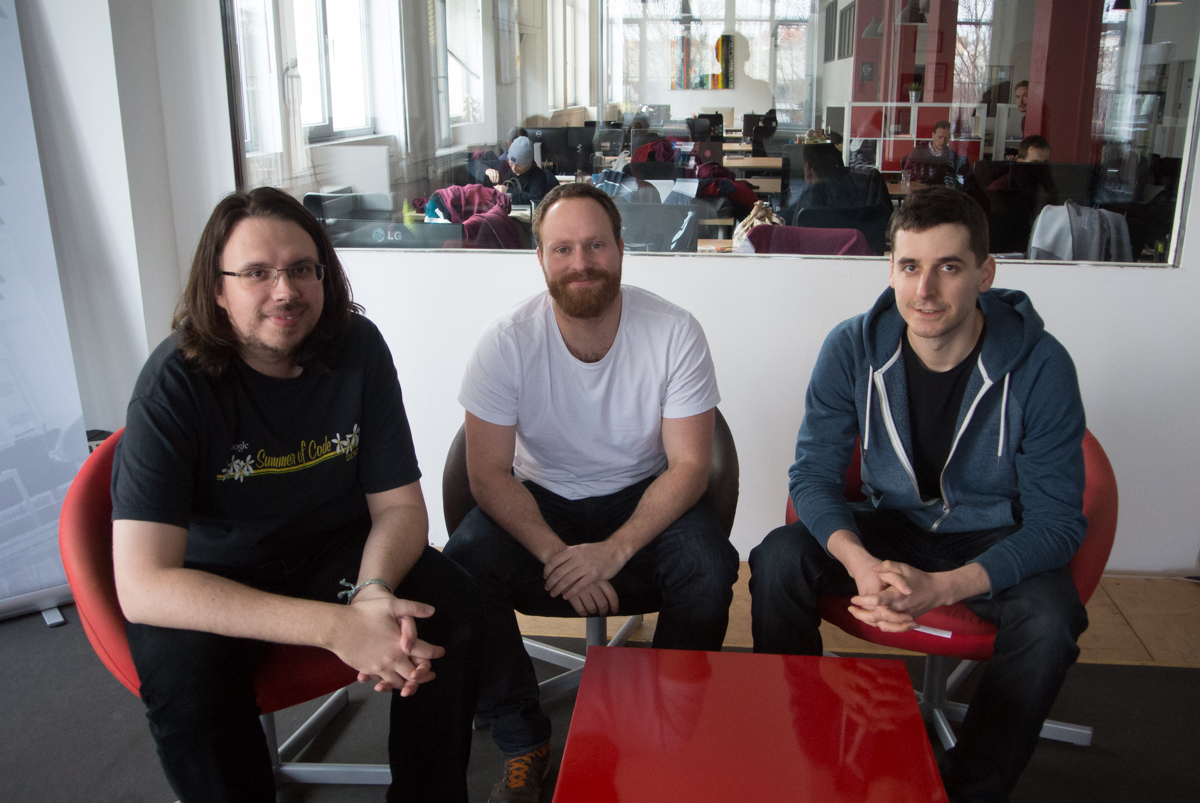
The Rossum Team: Petr Baudis (left), and Tomas Gogar (middle), with Tomas Tunys (right)
But on the other hand, for the other members of our team, Petr Baudis and particularly Tomas Gogar, I saw incredible changes in their thinking, and really noticeable growth in their abilities outside of the technology we are working on. The other Tom definitely has the business gene, and StartupYard brought it out in him and made him much more confident, and much more wise about the business, and all the challenges we face.
Honestly, I would be lying to say that this was an experience that transformed me as a person, but as a team we were quite transformed. We began to work with much more focus, and so much more effect, on problems that are going to help us grow and keep climbing new mountains.
I can see the difference between our mentality at the beginning, and our mentality today, and it is remarkable.
What would you say to someone like yourself, who is deeply invested in advancing new technologies, but doesn’t believe that an accelerator StartupYard is what they really need?
Well, I don’t want to make a case out of myself, but I would say this:
If you are on your own and you want to do business for whatever reason, then you definitely need something like StartupYard.
I am not a sell out. I will not claim StartupYard is the best thing that can happen to you, but I will say that from my experience the whole team behind it does its best to shape your idea (or if you have none, it helps you to formulate an idea) into a real and viable business.
It does so by providing access to a vast network of mentors, which you certainly do not have and who are non-technical for the most part. In the end many of these mentors can become your potential customers, while others can come up directly/indirectly with an opinion or an idea that can really move you forward in your own thoughts. Moreover, StartupYard teaches you how to think about your business and prepares you on how to talk and present your ideas appropriately. That’s the most crucial part: getting others to understand clearly what are you bringing to the table.
I guess I read this on the StartupYard blog, but I grew fond of it: you and your ideas need to be the fire and StartupYard is the gasoline that makes it go big. I know it sounds like a cliche, but the people behind StartupYard really live up to that message.
And if you are a part you a bigger team, where the others are eager to take over the business part and you have the luxury to concentrate on what you love, then it would really depend on the others, but after seeing the personal growth of Petr and Tomas after going through StartupYard, I can only recommend taking that chance and joining.
You can now apply for StartupYard Batch #9.
- Artificial Intelligence
- VR/AR
- IoT
- Cryptography
- Blockchain
Applications Open: Now
Applications Close: January 31st, 2018

